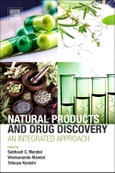Natural Products and Drug Discovery: An Integrated Approach provides an applied overview of the field, from traditional medicinal targets, to cutting-edge molecular techniques. Natural products have always been of key importance to drug discovery, but as modern techniques and technologies have allowed researchers to identify, isolate, extract and synthesize their active compounds in new ways, they are once again coming to the forefront of drug discovery.
Combining the potential of traditional medicine with the refinement of modern chemical technology, the use of natural products as the basis for drugs can help in the development of more environmentally sound, economical, and effective drug discovery processes. Natural Products & Drug Discovery: An Integrated Approach reflects on the current changes in this field, giving context to the current shift and using supportive case studies to highlight the challenges and successes faced by researchers in integrating traditional medicinal sources with modern chemical technologies. It therefore acts as a useful reference to medicinal chemists, phytochemists, biochemists, pharma R&D professionals, and drug discovery students and researchers.
Please Note: This is an On Demand product, delivery may take up to 11 working days after payment has been received.
Table of Contents
Section I: Traditional medicine and Drug discovery 1. Drug discovery from Ayurveda: Mode of approach and applications 2. Traditional and folk medicine as target for drug discovery 3. Bioactivity guided phyto-fractions: an emerging natural drug discovery tool for safe and effective disease management 4. Development of Chinese herbal health products for the prevention of aging-associated diseases 5. Ethnobotany / ethnopharmacology and bioprospecting: Issues on knowledge and uses of medicinal plants by Moroccan people 6. Chemotaxonomy of medicinal plants: Possibilities and limitations
Section II: Leads from Natural Products 7. The role of natural products from plants in the development of anticancer agents 8. Plant drugs in the treatment of osteoporosis 9. Phytodrugs and immunomodulators for the therapy of Leishmaniasis 10. Natural products targeting inflammation processes and multiple mediators 11. Biologically functional compounds from mushroom-forming fungi 12. Natural products in lifestyle diseases: In vitro screening 13. Common toxic plants and their forensic significance 14. Role of stress in diseases and its remedial approach by herbal and natural products in stress related disease management: Experimental studies and clinical reports 15. Anti-inflammatory medicinal plants: A remedy for most disease conditions
Section III: Herbal drug research 16. Techniques and technologies for the biodiscovery of novel small molecule drug lead compounds from natural products 17. Herb and drug interaction 18. Toxicity studies related to medicinal plants 19.Prebiotics: A functional food in health and disease 20. Cultivation of medicinal plants 21. Digitization of traditional knowledge 22. Good agricultural practices: Requirement for the production of quality herbal medicines 23. Fundamentals of microwave based sample preparation for plant based drug discovery








